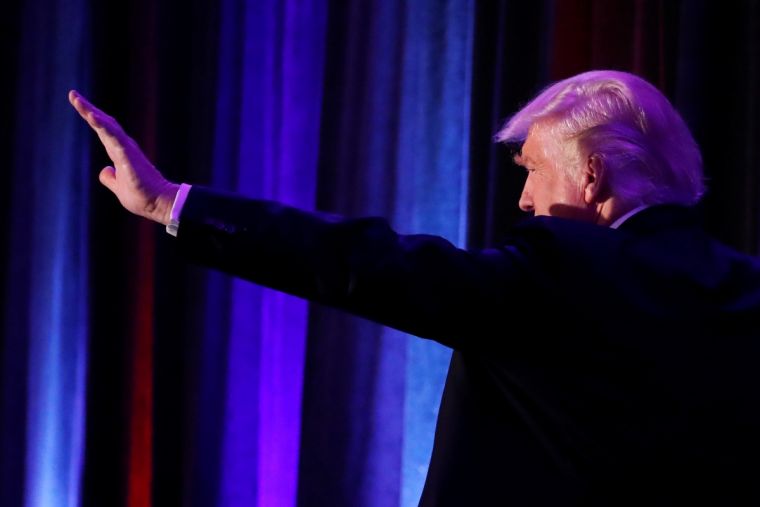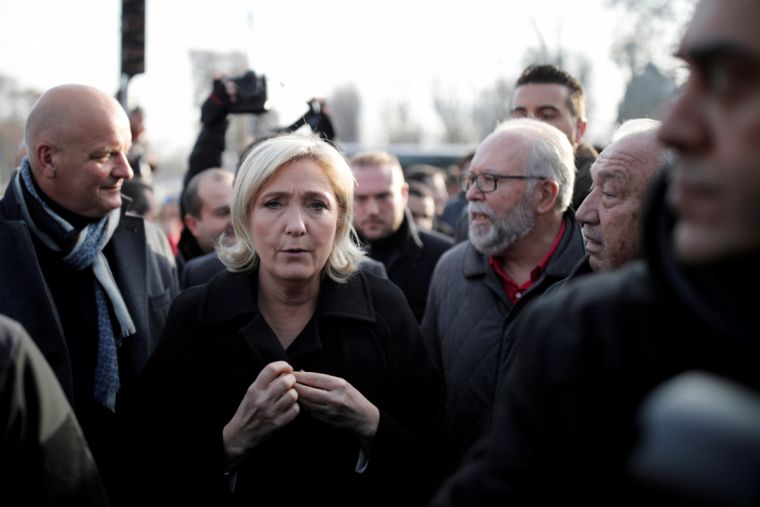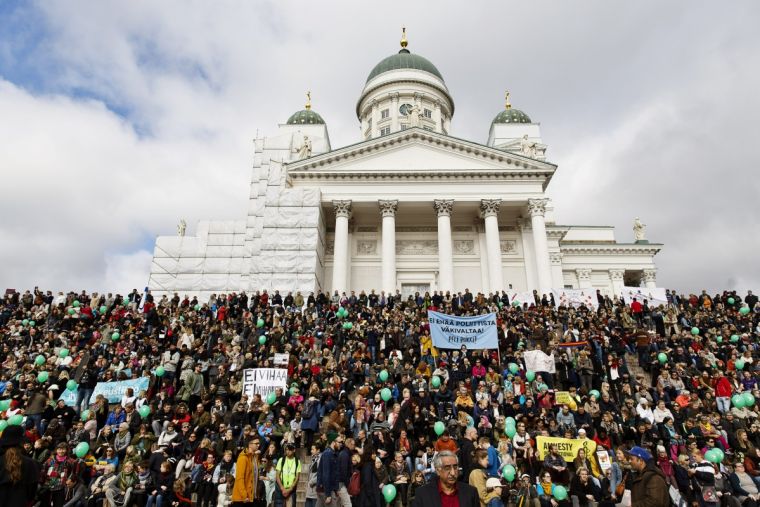Fascism And False Messiahs: Why The World Needs Christ More Than Ever
It is likely that the year 2016 will go down in history as a 'year of infamy'. Historians will look back on it as the beginning of a chain of events that set the world on the path towards a menacing authoritarianism. In this new authoritarian age, it seems that a new world is coming into being – a world that is moved not by the Christian values of love, compassion and solidarity, but by elemental powers and sinful passions, by the racial politics of blood and soil, the media-fabricated 'will of the people' and the demonic power of nationalistic pride.

Two decades after the horrors of the Second World War and the Holocaust, a historical amnesia has set in among the nations of the West. Fascism has now made a subtle return to the political mainstream. In the 1930s a hate-filled demagogue and populist leader, Adolf Hitler, was democratically elected by millions of Germans on the slogan that he would 'make Germany great again' after the humiliation of defeat in the First World War.
This is not to say, of course, that Brexit or the Trump election victory can be equated with the kind of fascism that arose in Europe in the early 20th century. There are clear differences and it is certainly not the case that every person who voted for Brexit or for Trump is a fascist sympathiser.
Nevertheless, there are signs that fascism is resurgent in the West and extremist groups have openly acclaimed the victories of Trump and the Leave campaign. Trump, Putin, Le Pen, Brexit, UKIP, and the resurgence of populism throughout the world – all these regrettable tendencies are symptomatic of an underlying spiritual crisis resulting from humankind's estrangement from God. They testify to the decadence of the world and the process of dehumanisation that is occurring in a fallen world buffeted by cruelty, conflict and a thoughtless indifference towards suffering people.

Instead of trusting in God and looking to the future with hope, many people seem to have put their trust in false messiahs and have capitulated to the basest sinful instincts of fear and selfishness. Trump and Brexit and the current fascist resurgence in the West indicate the desolation of a sin-sick humanity that has forsaken God and, in its turn, has been forsaken by God.
The result is that, instead of a culture of compassion and solidarity, we have a celebrity culture that is waging an undeclared war against the truth. We even have a new word in the Oxford English Dictionary, 'post-truth', to describe our lamentable condition.
Our age is also characterised by a brutish cruelty towards human beings. In an unjust world, justice is hard work and requires perpetual vigilance. The problem today is that many good people have become distracted and apathetic as the world sleepwalks into breakdown, further conflict and the potential of a global war.
Christians, like many other Western consumers, have become preoccupied with the latest gadgets and gossip. Many theologians have too often been shackled by a myopic preoccupation with minute details of biblical exegesis or with abstract metaphysical speculation. What profit is yielded by the sterile speculation on the eternal consubstantiation of the Persons of the Trinity, if we have nothing to say about relationships, popular culture, the human costs and the spiritual implications of living through a 'crisis of compassion' in a 'post-truth' age? How do we expect to engage with the world in a meaningful way?

In today's Western world Christianity has lost its vivacity and creative dynamism. Too often, Christianity has become inert, compromised and conformist. Instead of offering prophetic resistance to the dehumanising tendencies of this age, many Christians have unwittingly colluded with these anti-gospel forces.
Christianity still needs to be revealed to the world as a religion of universal compassion that can resist these demonic forces in the name of the Kingdom of God. But this will never happen so long as the best and most original Christian minds today are distracted by pointless disputes concerning the meaning of church sacraments, the authorship of the Pentateuch, the latest take on the Chalcedonian formula or the eternal pre-existence of the Second Hypostasis.
The crisis of compassion in contemporary society is expressed in the alluring falsehoods of secular humanism, consumerism and materialistic rationalism, which have made a wasteland of the human spirit. This crisis has been exacerbated by a world-denying false theology among many Christians, which reduces the whole meaning of the gospel of salvation in Christ to a transaction that results in the forgiveness of sins and the settling of heaven's accounts.
Instead of being salt and light, Christians have tended to avoid concrete issues of solidarity, justice and compassion and have opted instead to concern themselves with abstract and distant categories, such as the soul, heaven and eternity. Many Christians have become too enmired in a swamp of religious practices and metaphysical preoccupations to be concerned about the plight of the poor and the immeasurable suffering of a fallen world.
As a result of Christians' self-imposed evacuation from the pain of the world, the earth today is covered in shadows. The lamps of truth, compassion, solidarity, respect and courtesy are going out. It may even seem that the world is passing through its twilight period and entering the darkness of a universal night. But amid the prevailing darkness, the everlasting light still shines, summoning God's people to repentance and onto faith and courage.
I should mention that as an evangelical Christian, I take absolutely no consolation in the kind of bland clichés that insist that somehow 'God is still in control', despite the current deplorable developments in world politics. By this same logic, presumably 'God was still in control' between 1933 and 1945, but this didn't prevent Hitler from coming to power and starting a war that led to the death of over 50 million people, including an unprecedented genocide in which six million Jews were murdered by the Nazi regime. If history teaches Christians anything, it is that God respects our human freedom and allows human irrationality, ignorance, fear and hatred to take their destructive course.
However, we should not despair, because hope can be found elsewhere. Amid the darkness a new movement of the Holy Spirit can be discerned. This movement defies the dehumanising tendencies in contemporary society. It aims for the rediscovery of the true meaning of Christianity in terms of the creation of a global community of solidarity. This community radiates the gospel values of kindness, compassion, truth and justice. This community stands at the forefront of a new gospel movement that promotes a social context in which justice and peace can thrive. This movement is calling upon the global Christian community to embody and inculcate humane virtues in society, so that degenerate forces of inhumanity and callous indifference to the suffering of others would not be able to flourish.
Within this global Christian community, the gospel is emerging as a transformative and world-shattering message of the good news concerning the resurrection of Jesus Christ. This gospel message, purified from deadening legalism, has a new basis not in judgment and retribution, but in divine-human creativity, compassion and the indestructible power of resurrection life.
My prayer is that the Holy Spirit will raise up a new generation of followers of the Risen Christ, who can be at the spearhead of a new movement that resists the violent tendencies and zoological impulses of contemporary society. Given the difficult circumstances, it is inevitable that these people will be a minority. However, as Jesus said, it takes only a little yeast to leaven the whole lump of dough.
Christians, sooner or later, will need to face up to the fact that to be a follower of Jesus Christ in the Western world today is to be part of a dwindling minority in a world that is passing through a painful era of godforsakenness. It is our task to negotiate this passage by following the 'kindly light' step by step until the time has come for the final defeat of the evil, when the "kingdoms of this world will become the Kingdom of our God and His Christ" (Revelation 11:15). Therein lie our future and our hope.
Dr Joshua Searle is tutor in Theology and Public Thought at Spurgeon's College. He writes in a private capacity.











